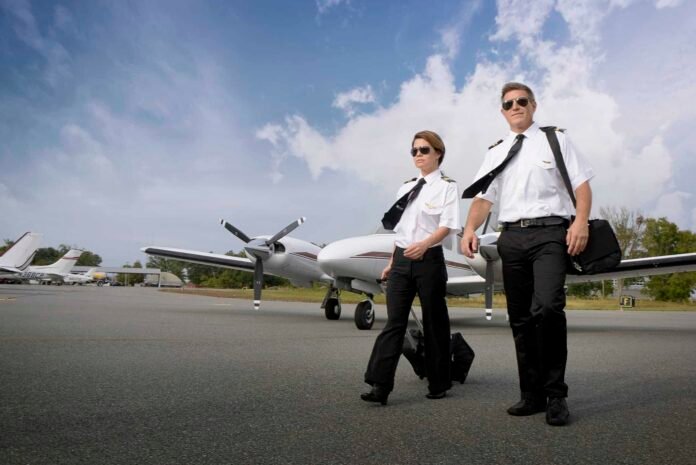In the dynamic world of aviation, the role of a cabin crew extends far beyond ensuring passenger safety and comfort. The importance of emotional intelligence in shaping an exceptional flight experience cannot be overstated. This pivotal skill set enables cabin crew members to navigate a myriad of challenges with grace and efficiency, fostering a positive environment for passengers and colleagues alike. For those pursuing a Flight Steward Course in Udaipur, understanding and developing emotional intelligence is crucial. This article explores how emotional intelligence can significantly enhance cabin crew performance, detailing its key components and practical applications in daily operations.
Understanding Emotional Intelligence
Emotional intelligence (EI) encompasses the ability to recognize, understand, and manage one’s own emotions and those of others. It involves five key components:
- Self-awareness: Recognizing and understanding one’s emotions.
- Self-regulation: Managing and controlling emotional responses.
- Motivation: Harnessing emotions to pursue goals with energy and persistence.
- Empathy: Understanding and sharing the feelings of others.
- Social skills: Managing relationships to move people in desired directions.
For cabin crew, these components are essential in maintaining composure under pressure, providing exceptional customer service, and working effectively as part of a team.
Self-awareness and Self-regulation
Self-awareness is the cornerstone of emotional intelligence. It allows cabin crew members to understand their emotional triggers and respond appropriately in high-stress situations. This self-awareness leads to better self-regulation, enabling crew members to remain calm and collected, ensuring passenger safety and comfort.
For example, during unexpected turbulence, a self-aware and self-regulated cabin crew member can manage their anxiety and project calmness, reassuring passengers and maintaining order. This ability is particularly emphasized in a Flight Steward Course in Udaipur, where practical training scenarios help students build these critical skills.
Motivation and Performance
A motivated cabin crew is essential for maintaining high standards of service and safety. Emotional intelligence fosters intrinsic motivation, helping crew members find personal satisfaction in their roles beyond external rewards. This internal drive is crucial for sustained performance, especially during long flights or in challenging conditions.
Training programs, such as those provided in Udaipur, emphasize the development of emotional intelligence to enhance motivation. By understanding the deeper purpose behind their duties, cabin crew members can approach their work with enthusiasm and dedication, significantly improving passenger experiences.
Empathy and Customer Service
Empathy is the ability to understand and share the feelings of others, a vital trait for cabin crew members. Empathetic crew can anticipate and address passengers’ needs, providing personalized service that enhances the overall flight experience. This skill is particularly important in handling passenger complaints or special requests.
For instance, if a passenger is anxious about flying, an empathetic cabin crew member can offer reassurance and support, making the passenger feel valued and cared for. This level of service not only improves passenger satisfaction but also builds the airline’s reputation for exceptional customer care.
Social Skills and Team Dynamics
Effective social skills are crucial for cabin crew members, who must work seamlessly as part of a team while managing interactions with passengers. Strong social skills help in building positive relationships with colleagues, fostering a collaborative work environment that enhances overall efficiency and service quality.
In Udaipur’s Airport Ground Staff Training in Udaipur, the focus on teamwork and communication prepares students to excel in real-world scenarios. By honing their social skills, aspiring cabin crew members learn to navigate interpersonal dynamics, resolve conflicts amicably, and contribute positively to their teams.
Practical Applications in Cabin Crew Duties
Handling Difficult Passengers
Dealing with difficult passengers is a common challenge for cabin crew. Emotional intelligence equips crew members with the patience and tact needed to de-escalate tense situations. By staying calm and empathetic, they can address passenger concerns effectively, turning potential conflicts into positive interactions.
Enhancing In-flight Service
The in-flight service experience is greatly enhanced by emotionally intelligent cabin crew. Their ability to read and respond to passengers’ emotional cues allows them to provide attentive and personalized service. This attention to detail creates a welcoming and comfortable atmosphere, encouraging passenger loyalty.
Crisis Management
In emergency situations, emotional intelligence is indispensable. Cabin crew must remain composed, think clearly, and lead passengers to safety. Their ability to manage their own emotions and understand passengers’ fears ensures a swift and orderly response, minimizing panic and enhancing safety.
Conclusion
Emotional intelligence is a vital skill for cabin crew, underpinning their ability to deliver superior performance and exceptional customer service. For those undertaking a Flight Steward Course in Udaipur, developing emotional intelligence is key to a successful career in aviation. By cultivating self-awareness, self-regulation, motivation, empathy, and social skills, cabin crew can navigate the challenges of their role with confidence and grace, ensuring a positive flight experience for all.
As the aviation industry continues to evolve, the emphasis on emotional intelligence will only grow, highlighting its importance in training programs and professional development. By prioritizing emotional intelligence, aspiring cabin crew members can position themselves for success, contributing to the safety, comfort, and satisfaction of passengers worldwide.



